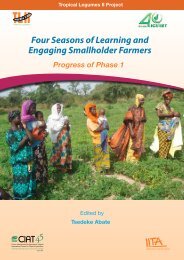Four Seasons of Learning and Engaging Smallholder Farmers - icrisat
Four Seasons of Learning and Engaging Smallholder Farmers - icrisat
Four Seasons of Learning and Engaging Smallholder Farmers - icrisat
Create successful ePaper yourself
Turn your PDF publications into a flip-book with our unique Google optimized e-Paper software.
Washim district) in spite <strong>of</strong> conducting promotional meetings due to the following reasons: pigeonpea<br />
intercrop with cotton was not permitted for seed certification (by the state seed certification agency),<br />
different varieties are supplied under production management packages, <strong>and</strong> farmers were reluctant in<br />
executing the Certified Seed production program.<br />
In Andhra Pradesh, Foundation Seed production <strong>of</strong> Asha <strong>and</strong> PRG 158 varieties was successfully<br />
implemented by following 300 m isolation distance between varieties in T<strong>and</strong>ur village in Ranga Reddy<br />
district <strong>and</strong> Kodangal village in Mahaboobnagar district. Seed grower farmers were satisfied with the<br />
outcome <strong>of</strong> their produce.<br />
Constraints <strong>and</strong> opportunities<br />
Pigeonpea seed delivery systems, storage <strong>and</strong> marketing in both target states (Andhra Pradesh <strong>and</strong><br />
Maharashtra) differ in constraints <strong>and</strong> opportunities. In Maharashtra, information was collected from<br />
farmers during the group discussions, meetings, training sessions, <strong>and</strong> field days. The constraints to<br />
develop an efficient seed storage, marketing <strong>and</strong> delivery system for pigeonpea were identified as lack<br />
<strong>of</strong> storage facilities, pigeonpea seed is more vulnerable to storage grain pests, lack <strong>of</strong> drying facilities<br />
(more relevant when harvesting coincides with unexpected rains), lack <strong>of</strong> processing, packaging, <strong>and</strong><br />
transport facilities, varying <strong>and</strong> inconsistent response <strong>of</strong> farmers to new varieties, <strong>and</strong> inconsistent<br />
market price by seed industries. In Andhra Pradesh, farmers face hard time in registering <strong>and</strong> getting<br />
their fields certified. However, farmers <strong>of</strong> this state consider selling seed as TL seed to co-farmers as an<br />
opportunity in seed delivery systems.<br />
Formal <strong>and</strong> informal seed sector linkages<br />
To facilitate efficient seed production <strong>and</strong> marketing, PDKV-Akola established linkages with Maharashtra<br />
State Seeds Corporation Limited (MSSCL) <strong>and</strong> Krishi Vigyan Kendras (KVKs) at Karda <strong>and</strong> Durgapura.<br />
While in Andhra Pradesh, ANGRAU-Hyderabad established similar linkages with Andhra Pradesh<br />
State Seeds Development Cooperation (APSSDC) <strong>and</strong> Adarsh Rythu for efficient production <strong>and</strong> seed<br />
diffusion. The involvement <strong>of</strong> APSSDC <strong>and</strong> Andhra Pradesh State Seed Certifying Agency (APSSCA)<br />
in roguing, inspection <strong>and</strong> selection, <strong>and</strong> certification <strong>of</strong> farmers’ seed production fields ensured<br />
purity <strong>and</strong> quality <strong>of</strong> pigeonpea seed. In addition, the seed village concept was instilled to grow one<br />
variety in target beneficiaries to guarantee isolation to avoid seed contamination. In Maharashtra, the<br />
involvement <strong>of</strong> MSSCL has linked farmer groups <strong>of</strong> selected villages involved in seed production for<br />
efficient marketing <strong>and</strong> diffusion <strong>of</strong> Certified Seed in Akola <strong>and</strong> Washim. The MSSCL function is to<br />
monitor seed production plots, which will lead to the assurance <strong>of</strong> the procurement <strong>of</strong> seed produced<br />
by the farmers.<br />
Transaction costs in seed marketing<br />
In Maharashtra, marketing <strong>of</strong> seed by individual farmer is not possible, but in Akola <strong>and</strong> Washim<br />
districts, farmers have organized themselves into groups to carry out marketing <strong>of</strong> their seed to other<br />
farmers. In both the districts, the government also provides seed subsidies under various schemes <strong>and</strong><br />
packages. In Andhra Pradesh, seed produced at the local level has the authenticity <strong>of</strong> the source <strong>of</strong><br />
seed, is much cheaper, is well perceived by local farmers since the varieties are adapted to the locality<br />
<strong>and</strong> are high yielding as compared to the seed procured from outside the districts or state.<br />
Promotion <strong>and</strong> formal recognition <strong>of</strong> informal seed sector<br />
In Maharashtra, there is a need to strengthen informal seed sector through the approach <strong>of</strong> ‘seed village<br />
concept’ where ‘one variety-one village’ strategy should be popularized because formal seed sector<br />
cannot lead to supply huge quantity <strong>of</strong> quality seeds. The seed village concept will solve the problem<br />
<strong>of</strong> the lack <strong>of</strong> quality seeds needed by the villages. However, in Andhra Pradesh, seed produced in<br />
Progress <strong>of</strong> Phase 1<br />
201

















